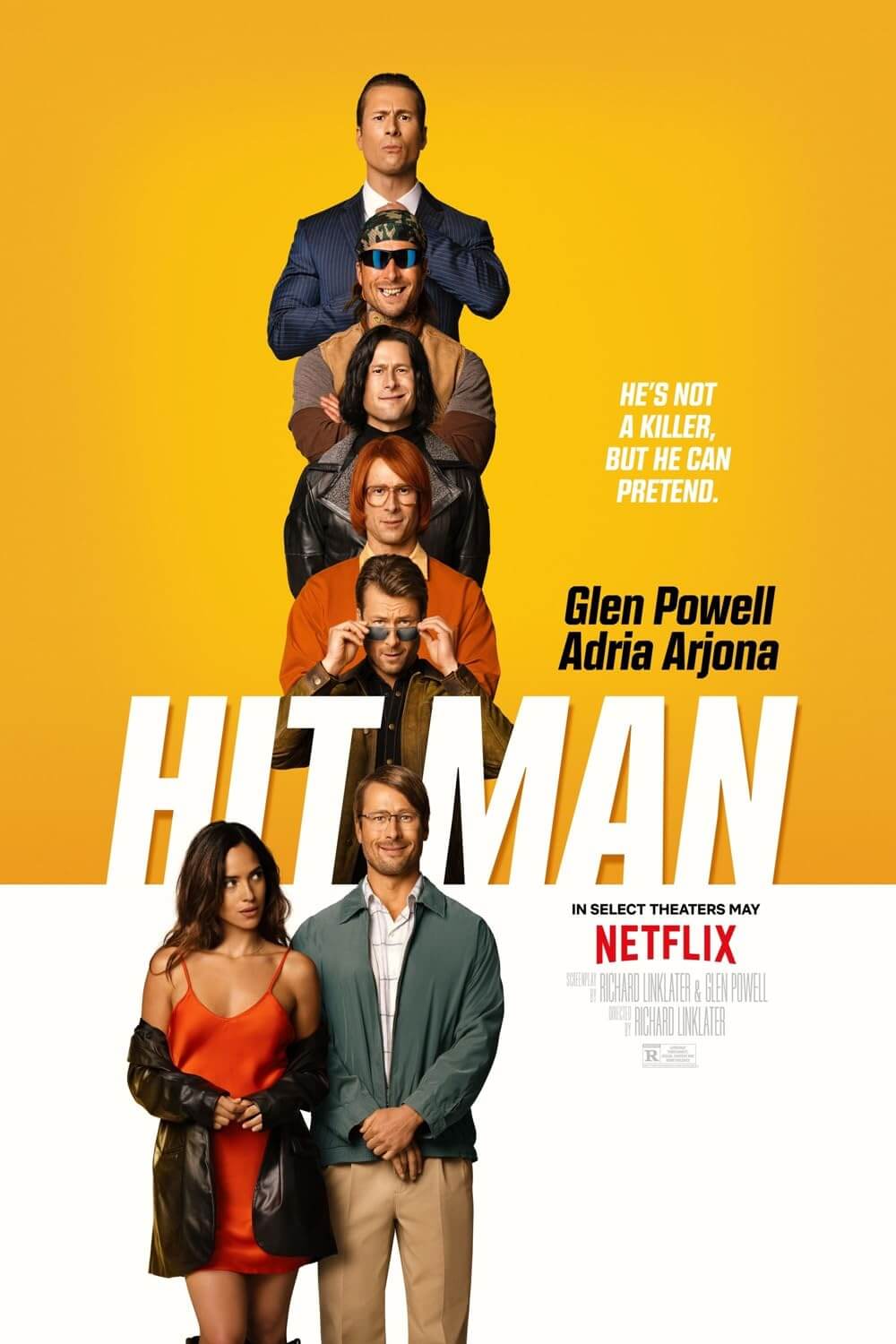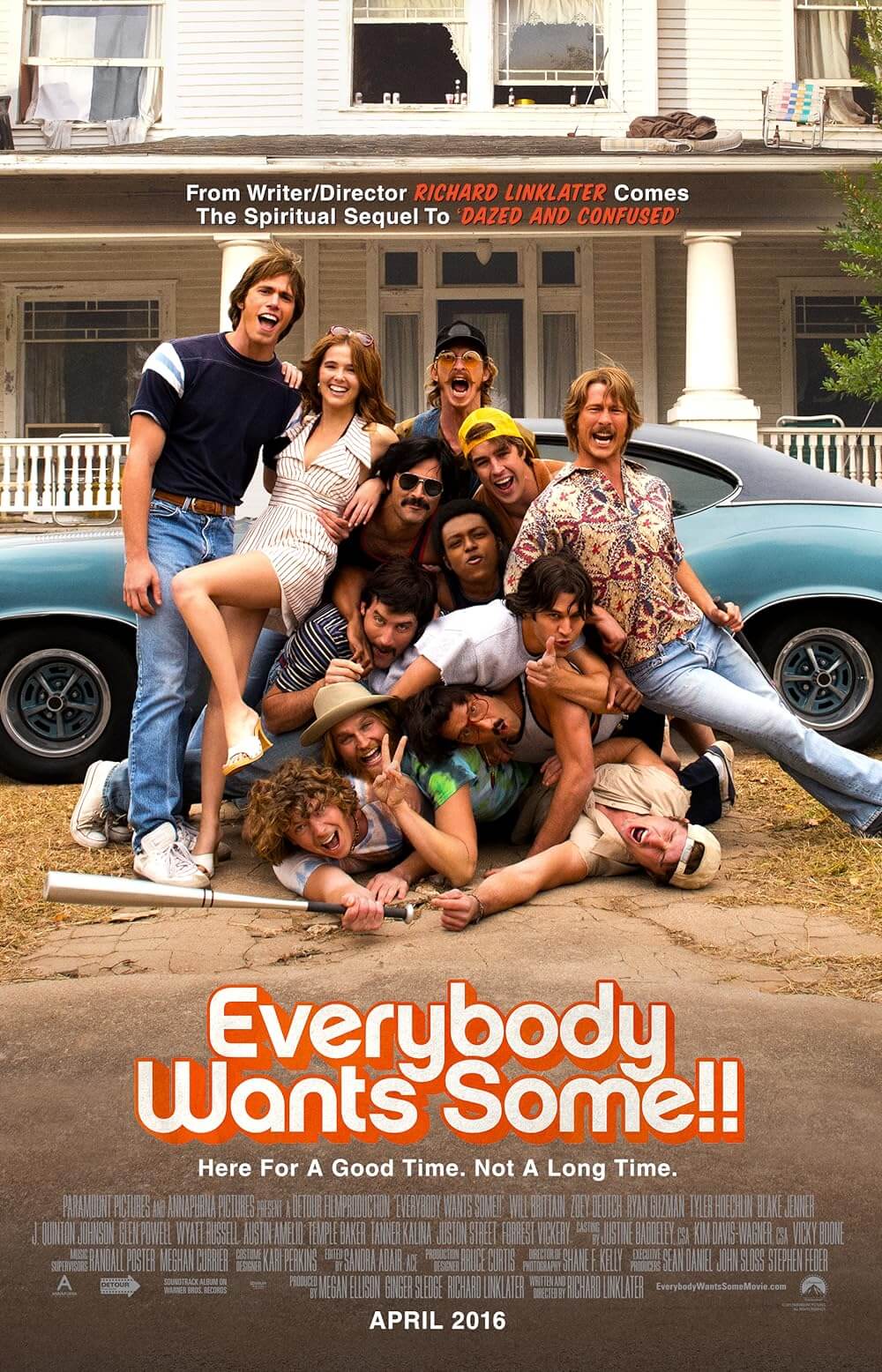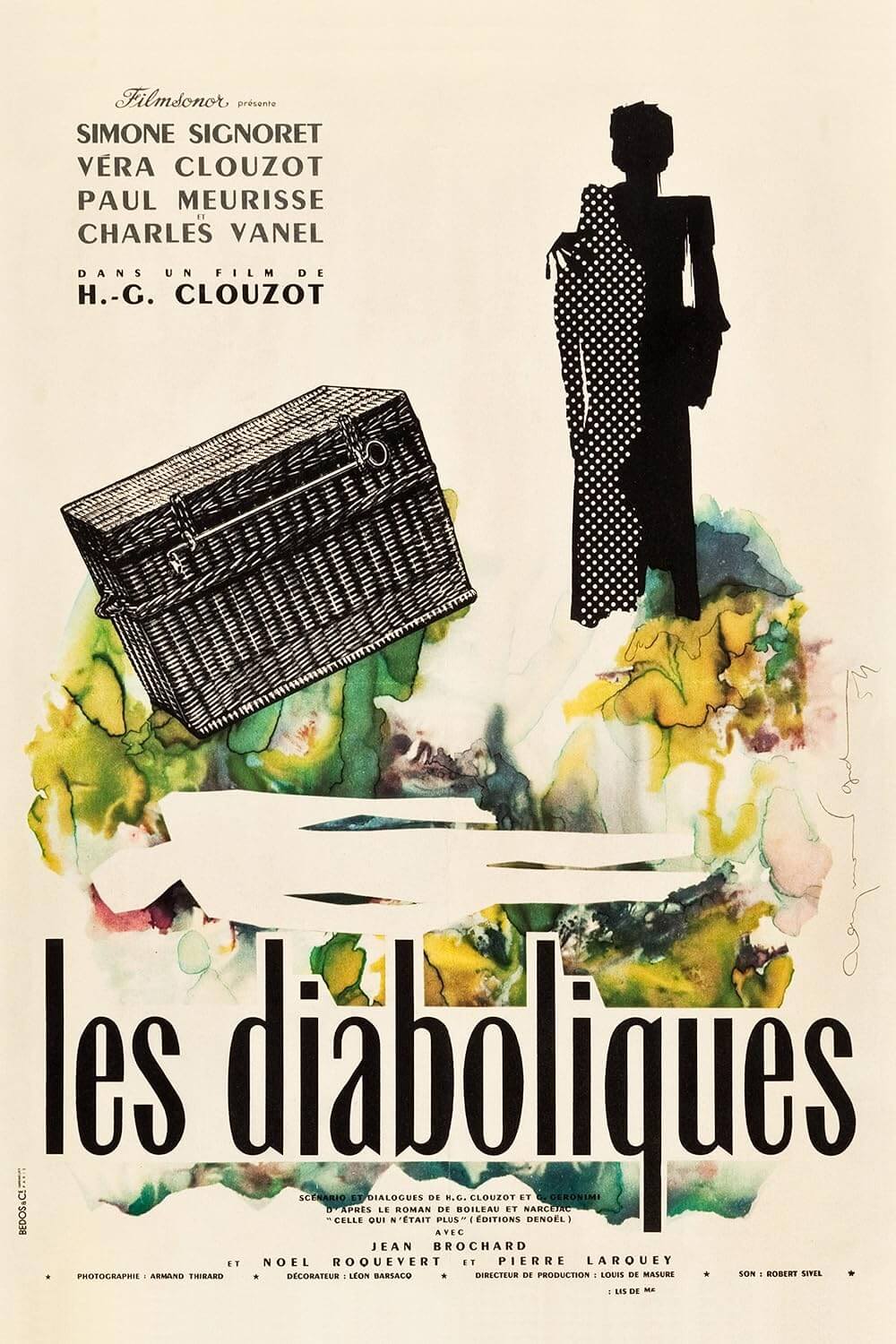
Hit Man
By Brian Eggert |
Richard Linklater’s Hit Man informs us that everything the movies have told us about contract killers is wrong. They don’t really exist. If a crime organization or mob family occasionally keeps enforcers around, willing to give someone a dirt nap, there’s certainly not an underground network of killers-for-hire like the one portrayed in the John Wick series. With movies and television perpetuating the myth, people often seek out hitmen online, hoping to pay a professional to rid themselves of an unwanted family member, troublesome spouse, or other undesirable characters. Enter Gary Johnson, an undercover police contractor in Houston, Texas, who poses as a gun-for-hire to catch those looking for the services of a professional hitman. If the scheme borders on entrapment, it’s more often successful in prosecuting those conspiring to commit murder. However serious that subject matter sounds, Linklater’s film is a delightfully entertaining blend of comedy, romance, and thrills, providing the first worthwhile showcase for Glen Powell, with whom the director wrote the script. Inspired by actual events (sort of), the film establishes Powell as a bonafide star with vast potential as both a leading man and character actor.
Hit Man has the same “somewhat true story” quality as several of the writer-director’s films, such as Apollo 10 1⁄2: A Space Age Childhood (2022) or Bernie (2011). These examples blend fact and fiction in ways that embrace the cinematic medium, not for its potential to relay information or convey real-life events with adherence to reality, but for its tendency to exaggerate in artistic and escapist ways. Whether through rotoscoped animation or flights of fancy, Linklater often uses his real-world inspirations for a film as a launchpad for something more expressive and rooted in genre. For instance, Apollo 10 1⁄2 captured his experiences growing up in Houston in a community shaped by NASA, yet he allowed preadolescent fantasy to inform his narrative. Similarly, Bernie told a true-crime yarn by blending documentary and fiction aesthetics into a uniquely accessible presentation. His latest draws from a Texas Monthly article titled “Hit Man” by Skip Hollandsworth, detailing the real Gary’s curious life as an instructor and undercover cop.
After acknowledging their fictionalization of Gary’s life, the film resituates the events to New Orleans, where Powell’s nerdy character first appears as a psychology instructor. A mild-mannered divorcé with a penchant for cats and birdwatching, Gary works with the NOPD on the side, helping officers Claudette (Retta) and Phil (Sanjay Rao) nab people seeking the services of a professional killer. When their regular undercover point man, Jasper (Austin Amelio), goes on suspension after beating up some teenagers, they enlist Gary, who proves adept at improvising and committing to the bit. He becomes the department’s regular, and for each target, he assumes a new identity, which he has tailored to the suspect by drawing from what he knows about psychology. For one sting, he might appear like Patrick Bateman, with Powell doing an amusing caricature of Christian Bale from American Psycho (2000); for another, he does a version of Matthew McConaughey with a neck tattoo. By researching his suspect, he adjusts his costume and appearance, fulfilling what he believes is their ideal hitman.
 The plot kicks into gear when Gary meets Maddy (Adria Arjona), a woman who considers hiring him to kill her abusive husband, Ray (Evan Holtzman). When he meets with Maddy, he adopts the persona of Ron, a strong, confident, and appealing personality—so much so that Claudette and Phil find themselves drawn to Ron more than Gary. Ron is everything Gary isn’t: adventurous, a dog person, romantic, a risk-taker, and a sexual dynamo. When Ron talks Maddy out of hiring him, he thwarts the sting operation but finds himself in a highly unethical romance with her. The situation becomes increasingly tense when Ray ends up dead, and Jasper, upset that Gary has replaced him, reveals that he knows what Gary’s been up to. Caught between several lies and an identity crisis, Gary remains at the center of a film that shifts between blithe cop comedy, neo-noir, and steamy thriller—and it does all of them extraordinarily well, with a hint of humor about murder that recalls Alfred Hitchcock’s work.
The plot kicks into gear when Gary meets Maddy (Adria Arjona), a woman who considers hiring him to kill her abusive husband, Ray (Evan Holtzman). When he meets with Maddy, he adopts the persona of Ron, a strong, confident, and appealing personality—so much so that Claudette and Phil find themselves drawn to Ron more than Gary. Ron is everything Gary isn’t: adventurous, a dog person, romantic, a risk-taker, and a sexual dynamo. When Ron talks Maddy out of hiring him, he thwarts the sting operation but finds himself in a highly unethical romance with her. The situation becomes increasingly tense when Ray ends up dead, and Jasper, upset that Gary has replaced him, reveals that he knows what Gary’s been up to. Caught between several lies and an identity crisis, Gary remains at the center of a film that shifts between blithe cop comedy, neo-noir, and steamy thriller—and it does all of them extraordinarily well, with a hint of humor about murder that recalls Alfred Hitchcock’s work.
Linklater and Powell have collaborated several times, going back to his small part in the filmmaker’s 2006 feature Fast Food Nation. A decade later, Powell had a memorable role in Linklater’s college baseball comedy Everybody Wants Some!! (2016) as a fast-talking chameleon willing to change his identity—from disco swinger to country line-dancer, from punk rocker to drama enthusiast—to whatever it takes to get laid. Similarly, Powell’s character in Hit Man has a fluid identity, depending on the situation, almost conspicuously so. It’s almost as though the writers chose this material to demonstrate Powell’s range to the world, allowing him to play various personalities with different accents in scenarios that alternate between thrilling and funny, sexy and charming. As a result, the technical filmmaking feels recessive next to Powell, with cinematographer Shane F. Kelly’s visuals and the score by Graham Reynolds presenting each scene without much notable style. Occasionally, it looks downright cheap. Note the frequent mugshots that flash onscreen after each of Gary’s arrests and how they look like bad Photoshopping.
It’s a purposefully straightforward aesthetic treatment for a picture that, in another filmmaker’s hands, might have had the same multifaceted identity as its protagonist in terms of style. Imagine a version of Hit Man that adopted the personality of each alter-ego in visual terms, and it might have seemed to suffer from an aesthetic personality disorder. But keeping the style on an even keel further showcases Powell’s ability to command the screen, no matter his character’s personality, without the film doing the heavy lifting. In another respect, the interchangeable identity Gary lectures about speaks to the central theme of Hit Man, which has the intellectual underpinnings of many Linklater efforts in that it’s about the “eternal mystery of human consciousness and personality.” During Gary’s lectures about identity, he breaks down the elements of id, ego, and superego, suggesting these remain permanent fixtures. Although he begins the film believing people cannot change, his undercover experiences teach him that identity is fluid and to “seize the identity you want for yourself.”
Hit Man suggests that, like the notion of the Self, hired killers do not exist. These are myths designed to create a sense of, in the former case, psychological order or, in the latter case, escapism. A common thread in Linklater films, these academic ideas never dominate or become overly preachy (apart from the literal lectures), allowing the smarter-than-average screenplay to center on what matters most: this film is a lot of fun. Although Powell received plenty of attention for last year’s vacuous rom-com Anyone But You opposite Sydney Sweeney, his reputation as today’s hot number is better justified in his scenes with Arjona, which exude chemistry and sex appeal. Hit Man is full of effortless entertainment value spanning multiple genres, and it’s a shame that Netflix has reduced this to a limited theatrical run, followed by a home on its streaming service. Nevertheless, this is a crowd-pleasing effort and star-making film—one that feels airy yet has a surprising complexity and darkness behind its many pleasures.

Unlock More from Deep Focus Review
To keep Deep Focus Review independent, I rely on the generous support of readers like you. By joining our Patreon community or making a one-time donation, you’ll help cover site maintenance and research materials so I can focus on creating more movie reviews and critical analysis. Patrons receive early access to reviews and essays, plus a closer connection to a community of fellow film lovers. If you value my work, please consider supporting DFR on Patreon or show your support in other ways.
Thank you for your readership!
Brian Eggert | Critic, Founder
Deep Focus Review







